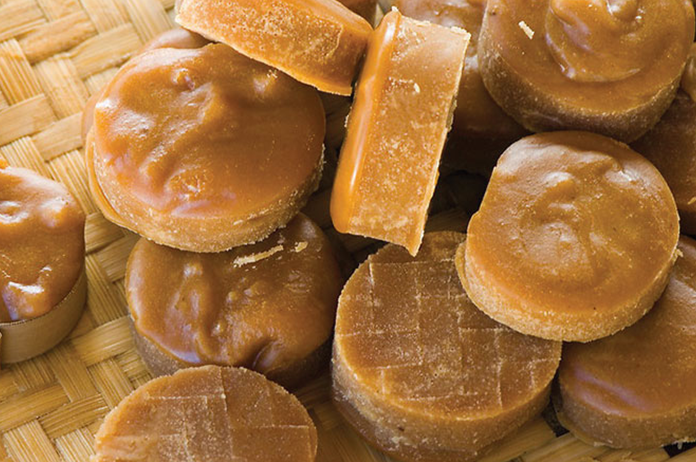Kampong Speu’s Palm Sugar To Earn GI Label In Upcoming Months
By
B2B Cambodia
on
Kampong Speu province’s palm sugar will be recognised as a geographical indication (GI) in the European Union early next year, an official from the Ministry of Commerce said.
 Palm sugar from Kampong Speu already enjoys GI recognition at home. KT/Mai Vireak
Op Rady, director of intellectual property at the ministry, told Khmer Times that palm sugar from Kampong Speu, which is already considered a GI product in the Kingdom, will become the second Cambodian product to be awarded GI status by the EU, and that registration will happen early 2019.
He explained, however, that the process is taking longer than expected.
“Our palm sugar was supposed to be registered in the EU in April this year. However, due to some issues regarding the definition of Kampong Speu palm sugar in EU law, the whole process has been delayed.
“Fortunately, we have managed to solve the issue and we have also adjusted our palm sugar guidebook to comply with EU law,” he said.
Having the product recognised as GI in the European market will protect against trademark infringements and raise prices, Mr Rady added.
In February last year, Kampot pepper became the first Cambodian product to receive GI certification from the EU. This means that any product sold in EU countries calling itself ‘Kampot pepper’ must come from a designated region that includes Kampot and neighbouring Kep province.
Sok Sarang, an advisor to the Kampong Speu Palm Sugar Promotion Association, told Khmer Times yesterday that the registration process for Kampong Speu’s palm sugar has now reached the final stages and that the EU will announce the award of GI status to the Cambodia product soon.
He explained that attaining GI status will boost sales in the European market.
“It will help reduce counterfeit products and build trust among consumers, enhancing market access worldwide.”
Hong Hoeung, director of the Kampong Speu Palm Sugar Development Community, which has about 100 members, said this year his community collected about 90 tonnes of palm sugar, with farmers earning $1.30 to $1.50 per kilogram.
He said he plans to increase production to 130 tonnes next year.
“EU recognition of our product as GI will further boost this production,” Mr Hoeung said. “It will also reduce farmer migration and increase the price of the product internationally.
“Getting a GI label is great news for the sector. It will help us fight against fake palm sugar.”
Chan Sokheang, chairman and CEO of Signatures of Asia, told Khmer Times that his company plans to purchase about 130 tonnes of organic palm sugar from Kampong Speu and other Cambodian provinces.
Signatures of Asia will spend around $234,000 to buy the palm sugar, which will be exported to the EU, mainly Italy, Spain, the Netherlands, Germany, Czech Republic, and France, Mr Sokheang added.
This article was originally published in the Khmer Times.
Palm sugar from Kampong Speu already enjoys GI recognition at home. KT/Mai Vireak
Op Rady, director of intellectual property at the ministry, told Khmer Times that palm sugar from Kampong Speu, which is already considered a GI product in the Kingdom, will become the second Cambodian product to be awarded GI status by the EU, and that registration will happen early 2019.
He explained, however, that the process is taking longer than expected.
“Our palm sugar was supposed to be registered in the EU in April this year. However, due to some issues regarding the definition of Kampong Speu palm sugar in EU law, the whole process has been delayed.
“Fortunately, we have managed to solve the issue and we have also adjusted our palm sugar guidebook to comply with EU law,” he said.
Having the product recognised as GI in the European market will protect against trademark infringements and raise prices, Mr Rady added.
In February last year, Kampot pepper became the first Cambodian product to receive GI certification from the EU. This means that any product sold in EU countries calling itself ‘Kampot pepper’ must come from a designated region that includes Kampot and neighbouring Kep province.
Sok Sarang, an advisor to the Kampong Speu Palm Sugar Promotion Association, told Khmer Times yesterday that the registration process for Kampong Speu’s palm sugar has now reached the final stages and that the EU will announce the award of GI status to the Cambodia product soon.
He explained that attaining GI status will boost sales in the European market.
“It will help reduce counterfeit products and build trust among consumers, enhancing market access worldwide.”
Hong Hoeung, director of the Kampong Speu Palm Sugar Development Community, which has about 100 members, said this year his community collected about 90 tonnes of palm sugar, with farmers earning $1.30 to $1.50 per kilogram.
He said he plans to increase production to 130 tonnes next year.
“EU recognition of our product as GI will further boost this production,” Mr Hoeung said. “It will also reduce farmer migration and increase the price of the product internationally.
“Getting a GI label is great news for the sector. It will help us fight against fake palm sugar.”
Chan Sokheang, chairman and CEO of Signatures of Asia, told Khmer Times that his company plans to purchase about 130 tonnes of organic palm sugar from Kampong Speu and other Cambodian provinces.
Signatures of Asia will spend around $234,000 to buy the palm sugar, which will be exported to the EU, mainly Italy, Spain, the Netherlands, Germany, Czech Republic, and France, Mr Sokheang added.
This article was originally published in the Khmer Times.